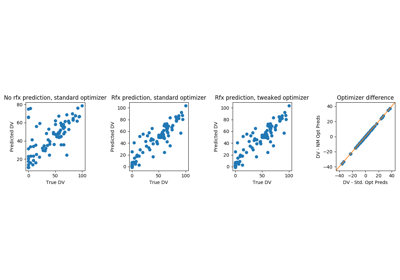sklmer.LmerRegressor¶
-
class
sklmer.LmerRegressor(formula, X_cols, predict_rfx=False, family='gaussian', fit_kwargs={})[source]¶ A regressor that wraps pymer4’s lme4 implementation.
This regressor requires a formula be defined in LME4’s style, see pymer4’s cheatsheet: http://eshinjolly.com/pymer4/rfx_cheatsheet.html
- Parameters
- formulastr
Lmer formatted formula string.
- X_colslist
List of the names of the X columns.
- predict_rfx: bool, default=’False’
Whether or not the predict method should use random effects in the prediction.
- family: str, default=’gausian’
What family of distributions to use for the link function for the generalized model.
- fit_kwargs: dict, defalut=’{}’
Dictionary of options to pass to lmer fit. See http://eshinjolly.com/pymer4/api.html
-
__init__(self, formula, X_cols, predict_rfx=False, family='gaussian', fit_kwargs={})[source]¶ Initialize self. See help(type(self)) for accurate signature.
-
fit(self, X=None, y=None, data=None)[source]¶ Fit the specified mixed effects model.
- Parameters
- Xarray-like, shape (n_samples, n_features)
The training input samples.
- yarray-like, shape (n_samples,)
The target values (class labels in classification, real numbers in regression).
- data: pandas.DataFrame
Data can also be passed to fit as a dataframe.
- Returns
- selfobject
Returns self.
-
get_params(self, deep=True)¶ Get parameters for this estimator.
- Parameters
- deepbool, default=True
If True, will return the parameters for this estimator and contained subobjects that are estimators.
- Returns
- paramsmapping of string to any
Parameter names mapped to their values.
-
predict(self, X=None, data=None, **kwargs)[source]¶ Predict based on the fitted mixed effects model.
Will use random effects if the estimators predict_rfx attribute is true.
- Parameters
- Xarray-like, shape (n_samples, n_features)
The training input samples.
- data: pandas.DataFrame
Data can also be passed as a dataframe.
- **kwargs:
Passed through to the pymer4.Lmer.predict method
- Returns
- yndarray, shape (n_samples,)
Returns predicted values
-
score(self, X, y, sample_weight=None)¶ Return the coefficient of determination R^2 of the prediction.
The coefficient R^2 is defined as (1 - u/v), where u is the residual sum of squares ((y_true - y_pred) ** 2).sum() and v is the total sum of squares ((y_true - y_true.mean()) ** 2).sum(). The best possible score is 1.0 and it can be negative (because the model can be arbitrarily worse). A constant model that always predicts the expected value of y, disregarding the input features, would get a R^2 score of 0.0.
- Parameters
- Xarray-like of shape (n_samples, n_features)
Test samples. For some estimators this may be a precomputed kernel matrix or a list of generic objects instead, shape = (n_samples, n_samples_fitted), where n_samples_fitted is the number of samples used in the fitting for the estimator.
- yarray-like of shape (n_samples,) or (n_samples, n_outputs)
True values for X.
- sample_weightarray-like of shape (n_samples,), default=None
Sample weights.
- Returns
- scorefloat
R^2 of self.predict(X) wrt. y.
Notes
The R2 score used when calling
scoreon a regressor will usemultioutput='uniform_average'from version 0.23 to keep consistent withr2_score(). This will influence thescoremethod of all the multioutput regressors (except forMultiOutputRegressor). To specify the default value manually and avoid the warning, please either callr2_score()directly or make a custom scorer withmake_scorer()(the built-in scorer'r2'usesmultioutput='uniform_average').
-
set_params(self, **params)¶ Set the parameters of this estimator.
The method works on simple estimators as well as on nested objects (such as pipelines). The latter have parameters of the form
<component>__<parameter>so that it’s possible to update each component of a nested object.- Parameters
- **paramsdict
Estimator parameters.
- Returns
- selfobject
Estimator instance.
